Podcast
Questions and Answers
Which of the following intellectual revolutions is NOT associated with the theory of evolution by natural selection?
Which of the following intellectual revolutions is NOT associated with the theory of evolution by natural selection?
- Meso-American (correct)
- Freudian
- Darwinian
- Copernican
Who proposed the heliocentric model of the solar system?
Who proposed the heliocentric model of the solar system?
- Galileo Galilei
- Albert Einstein
- Nicolaus Copernicus (correct)
- Isaac Newton
Which of the following was NOT an impact of Copernicus's revolutionary ideas?
Which of the following was NOT an impact of Copernicus's revolutionary ideas?
- Theory that the Earth is not the center of the Universe
- Advancements in Astronomy by Galileo and Kepler
- Pathways to the Scientific Revolution
- Invention of the microscope (correct)
Which intellectual revolution primarily focused on understanding subconscious motivations and the structure of the human psyche?
Which intellectual revolution primarily focused on understanding subconscious motivations and the structure of the human psyche?
The invention of the steam engine by James Watt was crucial to which historical revolution?
The invention of the steam engine by James Watt was crucial to which historical revolution?
Which revolution introduced a challenge to the idea of human origins and the place of humans in nature?
Which revolution introduced a challenge to the idea of human origins and the place of humans in nature?
Which of the following primarily supported the geocentric view of the universe before the Copernican model was introduced?
Which of the following primarily supported the geocentric view of the universe before the Copernican model was introduced?
What part of the mind did Freud identify as being responsible for controlling voluntary actions?
What part of the mind did Freud identify as being responsible for controlling voluntary actions?
During which administration was the Department of Information and Communications Technology established?
During which administration was the Department of Information and Communications Technology established?
Which area of the Philippines is primarily home to the Mangyan indigenous people?
Which area of the Philippines is primarily home to the Mangyan indigenous people?
Flashcards
Darwinian Revolution
Darwinian Revolution
A period of significant change in societal views about human origins and place in nature, challenging previous ideas.
Copernican Revolution
Copernican Revolution
A paradigm shift in the understanding of the universe, challenging the geocentric view.
Unconscious mind (Freud)
Unconscious mind (Freud)
The part of the mind that is not directly accessible to awareness.
Department of Information and Communications Technology (Philippines)
Department of Information and Communications Technology (Philippines)
Signup and view all the flashcards
Mangyan
Mangyan
Signup and view all the flashcards
Heliocentric Model
Heliocentric Model
Signup and view all the flashcards
Natural Selection
Natural Selection
Signup and view all the flashcards
Freudian Revolution
Freudian Revolution
Signup and view all the flashcards
Scientific Revolution
Scientific Revolution
Signup and view all the flashcards
Industrial Revolution
Industrial Revolution
Signup and view all the flashcards
Study Notes
Multiple Choice Questions
- Question 1: Earliest known Chinese paper primary material was Mulberry Tree Bark.
- Question 2: Antecedent.
- Question 3: Laboratorio Municipal de Ciudad de Manila created in 1888
- Question 4: Papyrus Sheets.
- Question 5: Gunpowder
- Question 6: Hero of Alexandria invented the Aeolipile.
- Question 7: Compass
- Question 8: Transistor.
- Question 9: Gunpowder
- Question 10: Jose Rizal
- Question 11: Protect northern borders from invaders.
- Question 12: Samuel Morse.
- Question 13: Bureau of Science.
- Question 14: Ptolemy.
- Question 15: Ctesibius.
- Question 16: Sexagesimal
- Question 17: Bureau of Science
- Question 18: Tropical diseases
- Question 19: India
- Question 20: Rediscovery of classical learning and scientific inquiry.
- Question 21: Aristotle.
- Question 22: Chinese
- Question 23: Copernican Revolution.
- Question 24: The Manhattan Project.
- Question 25: Middle east = Quipu
- Question 26: Pleasure is highlighted when one child does not satisfy his/her needs.
- Question 27: The idea that the Earth revolves around the Sun.
- Question 28: Values and moral
- Question 29: Mandatory education.
- Question 30: Darwinian.
- Question 31: Nicolaus Copernicus.
- Question 32: It provided pathways to Scientific Revolution and development of scientific method.
- Question 33: Darwin.
- Question 34: Darwinian Revolution.
- Question 35: It challenged ideas about human origin and our place in nature.
- Question 36: Meso-American
- Question 37: Psychology.
- Question 38: Freudian.
- Question 39: Industrial Revolution.
- Question 40: Agricultural innovations, philosophical transformations, and societal.
- Question 41: Aristotle and Ptolemy.
- Question 42: The part of the mind that is not directly accessible to consciousness.
- Question 43: Benigno Aquino.
- Question 44: To train professionals for international migration.
- Question 45: Spanish Colonial.
- Question 46: American Colonization.
- Question 47: Developing luxury goods.
- Question 48: National Disaster Risk Reduction Plan.
- Question 49: Agriculture and health.
- Question 50: Micromanagement
- Question 51: Mindoro.
- Question 52: Lack of interest in international collaboration
- Question 53: Driving innovation and economic growth
- Question 54: Introducing the concept of psychoanalysis and therapy.
- Question 55: Renewable energy solutions
- Question 56: Benigno Aquino Administration
- Question 57: Fidel Ramos Administration
- Question 58: Colonization by Spain
- Question 59: Road system.
- Question 60: Electricity.
- Question 61: K-12 Science Curriculum
- Question 62: By preparing a workforce for global competition.
- Question 63: Terrace farming
- Question 64: Spanish Era
- Question 65: Tax exemptions for international imports.
- Question 66: Sustainable Development Goals
- Question 67: Enframing
- Question 68: Epicurus
- Question 69: Essence.
- Question 70: To define the meaning of the good life for individuals.
- Question 71: Aristotle
- Question 72: Intrinsic, Instrumental, Ultimate
- Question 73: Bringing-forth
- Question 74: The ethical dilemmas arising from robot integration into society.
- Question 75: Robots might lack empathy, impacting patient interaction
- Question 76: Make life more efficient and less stressful.
- Question 77: Advancing technology for economic growth.
- Question 78: it is for extracting something from nature, storing it, and distributing it.
- Question 79: Stoicism
- Question 80: Moral decision-making.
- Question 81: Enframing
- Question 82: Aristotle
- Question 83: Ethical and moral guidelines for robot behavior.
- Question 84: Fiber Optics.
- Question 85: Claude E. Shannon.
- Question 86: The World Wide Web.
- Question 87: use of analog memory system.
- Question 88: Claude Shannon.
- Question 89: All of the above.
- Question 90: Delayed decisions due to an overload of information.
- Question 91: digitization
- Question 92: Relying on information retrieval rather than critical thinking.
- Question 93: Allowed recruiters to engage with a wider pool of candidates
- Question 94: Lazy analytics.
- Question 95: 15th century
- Question 96: Relying on information retrieval rather than critical thinking
- Question 97: Decreased productivity
- Question 98: By laying the foundation for digital communication and data transmission.
- Question 99: It allowed the confirmation of any hypothesis, whether valid or not
- Question 100: Increased difficulty in finding employment
- Question 101: It expanded the definition of "friends" to include virtual connections.
- Question 102: Decreased productivity
- Question 103: Claude E. Shannon.
- Question 104: Fake News
- Question 105: Ecologists.
- Question 106: Microscope.
- Question 107: Nanotechnology.
- Question 108: Multilayered butterfly wings.
- Question 109: Testing for skin safety and long-term effects
- Question 110: Expanding the Industrial Revolution's impact.
- Question 111: Beta-carotene or Vitamin A.
- Question 112: Genetically Modified Organisms
- Question 113: one billionth of a meter.
- Question 114: To enhance vitamin A content.
- Question 115: Advanced diagnostic and imaging tools.
- Question 116: 1,000,000 nanometers.
- Question 117: Advanced diagnostic and imaging tools.
- Question 118: Modified viruses.
- Question 119: Absorb UV radiation more efficiently without leaving a visible residue
- Question 120: Lorem
- Question 121: Lorem
- Question 122: Nanotechnology
- Question 123: Introducing genetic material into cells to treat diseases.
- Question 124: It can pass genetic modifications to future generations.
- Question 125: Resistance to the European corn borer
- Question 126: It can pass genetic modifications to future generations.
- Question 127: Philippine Clean Air Act.
- Question 128: Reducing waste at the source.
- Question 129: Coal.
- Question 130: How to make it universally accessible without high costs..
- Question 131: RA 9003
- Question 132: Decreased waste in landfills.
- Question 133: Conserving resources for future generations
- Question 134: The environmental impact of a person, community, or population to its space and environment.
- Question 135: Open dumping.
- Question 136: The environmental impact of an individual or population
- Question 137: Fossil fuel consumption
- Question 138: All of the above.
- Question 139: Decreased waste in landfills
- Question 140: The environmental impact of an individual or population
- Question 141: Loss of species and dramatic decline in biodiversity.
- Question 142: Encourage urban development near water sources
- Question 143: Philippine Clean Water Act.
- Question 144: Aluminum cans
- Question 145: All of the above.
- Question 146: Risk to public health and environmental damage.
- Question 147: Open dumping.
- Question 148: Rising sea levels and melting glaciers.
- Question 149: They ensure better environmental and health standards.
- Question 150: Global warming
Studying That Suits You
Use AI to generate personalized quizzes and flashcards to suit your learning preferences.




